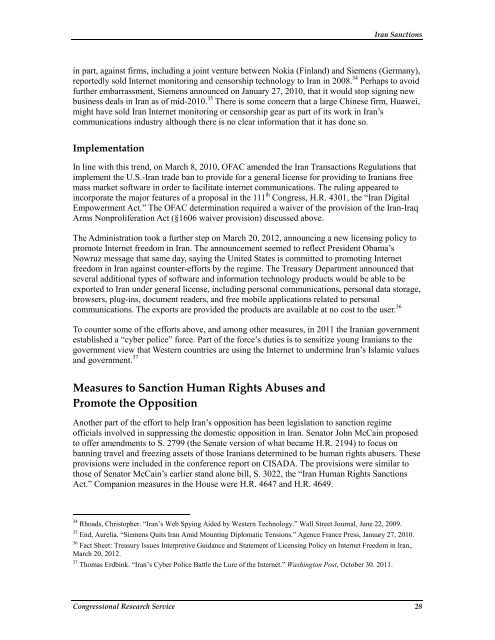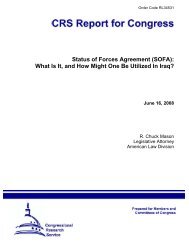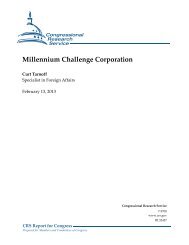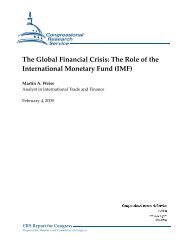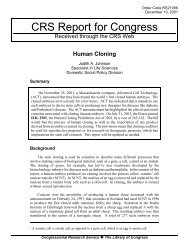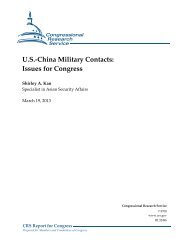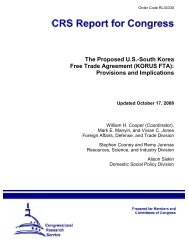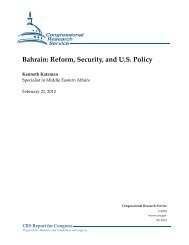Iran Sanctions - Foreign Press Centers
Iran Sanctions - Foreign Press Centers
Iran Sanctions - Foreign Press Centers
You also want an ePaper? Increase the reach of your titles
YUMPU automatically turns print PDFs into web optimized ePapers that Google loves.
<strong>Iran</strong> <strong>Sanctions</strong><br />
in part, against firms, including a joint venture between Nokia (Finland) and Siemens (Germany),<br />
reportedly sold Internet monitoring and censorship technology to <strong>Iran</strong> in 2008. 34 Perhaps to avoid<br />
further embarrassment, Siemens announced on January 27, 2010, that it would stop signing new<br />
business deals in <strong>Iran</strong> as of mid-2010. 35 There is some concern that a large Chinese firm, Huawei,<br />
might have sold <strong>Iran</strong> Internet monitoring or censorship gear as part of its work in <strong>Iran</strong>’s<br />
communications industry although there is no clear information that it has done so.<br />
Implementation<br />
In line with this trend, on March 8, 2010, OFAC amended the <strong>Iran</strong> Transactions Regulations that<br />
implement the U.S.-<strong>Iran</strong> trade ban to provide for a general license for providing to <strong>Iran</strong>ians free<br />
mass market software in order to facilitate internet communications. The ruling appeared to<br />
incorporate the major features of a proposal in the 111 th Congress, H.R. 4301, the “<strong>Iran</strong> Digital<br />
Empowerment Act.” The OFAC determination required a waiver of the provision of the <strong>Iran</strong>-Iraq<br />
Arms Nonproliferation Act (§1606 waiver provision) discussed above.<br />
The Administration took a further step on March 20, 2012, announcing a new licensing policy to<br />
promote Internet freedom in <strong>Iran</strong>. The announcement seemed to reflect President Obama’s<br />
Nowruz message that same day, saying the United States is committed to promoting Internet<br />
freedom in <strong>Iran</strong> against counter-efforts by the regime. The Treasury Department announced that<br />
several additional types of software and information technology products would be able to be<br />
exported to <strong>Iran</strong> under general license, including personal communications, personal data storage,<br />
browsers, plug-ins, document readers, and free mobile applications related to personal<br />
communications. The exports are provided the products are available at no cost to the user. 36<br />
To counter some of the efforts above, and among other measures, in 2011 the <strong>Iran</strong>ian government<br />
established a “cyber police” force. Part of the force’s duties is to sensitize young <strong>Iran</strong>ians to the<br />
government view that Western countries are using the Internet to undermine <strong>Iran</strong>’s Islamic values<br />
and government. 37<br />
Measures to Sanction Human Rights Abuses and<br />
Promote the Opposition<br />
Another part of the effort to help <strong>Iran</strong>’s opposition has been legislation to sanction regime<br />
officials involved in suppressing the domestic opposition in <strong>Iran</strong>. Senator John McCain proposed<br />
to offer amendments to S. 2799 (the Senate version of what became H.R. 2194) to focus on<br />
banning travel and freezing assets of those <strong>Iran</strong>ians determined to be human rights abusers. These<br />
provisions were included in the conference report on CISADA. The provisions were similar to<br />
those of Senator McCain’s earlier stand alone bill, S. 3022, the “<strong>Iran</strong> Human Rights <strong>Sanctions</strong><br />
Act.” Companion measures in the House were H.R. 4647 and H.R. 4649.<br />
34<br />
Rhoads, Christopher. “<strong>Iran</strong>’s Web Spying Aided by Western Technology.” Wall Street Journal, June 22, 2009.<br />
35<br />
End, Aurelia. “Siemens Quits <strong>Iran</strong> Amid Mounting Diplomatic Tensions.” Agence France <strong>Press</strong>, January 27, 2010.<br />
36<br />
Fact Sheet: Treasury Issues Interpretive Guidance and Statement of Licensing Policy on Internet Freedom in <strong>Iran</strong>,.<br />
March 20, 2012.<br />
37<br />
Thomas Erdbink. “<strong>Iran</strong>’s Cyber Police Battle the Lure of the Internet.” Washington Post, October 30. 2011.<br />
Congressional Research Service 28


